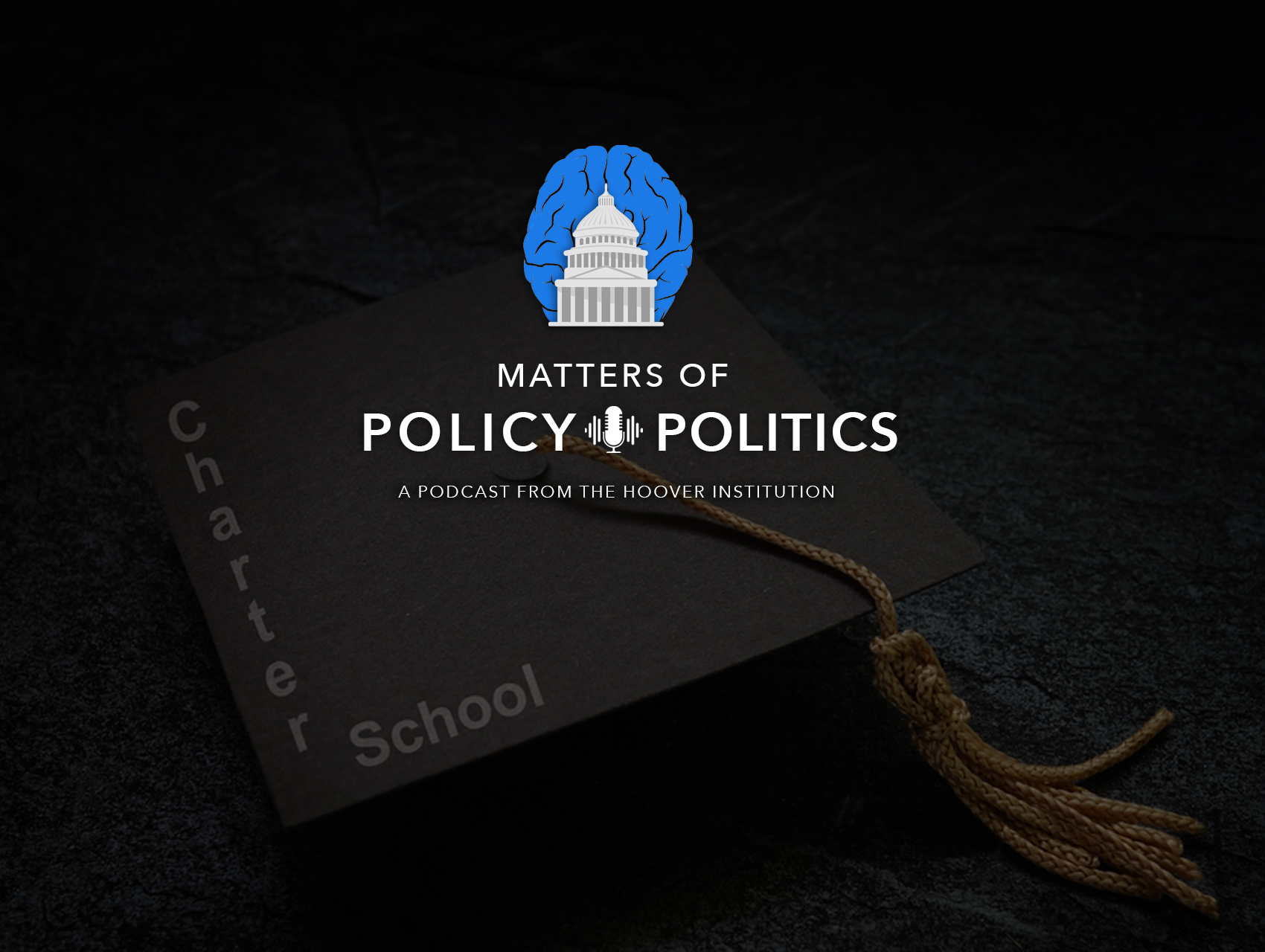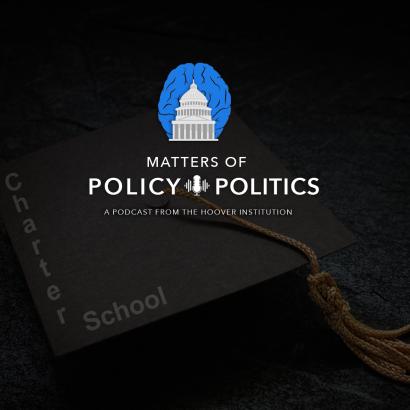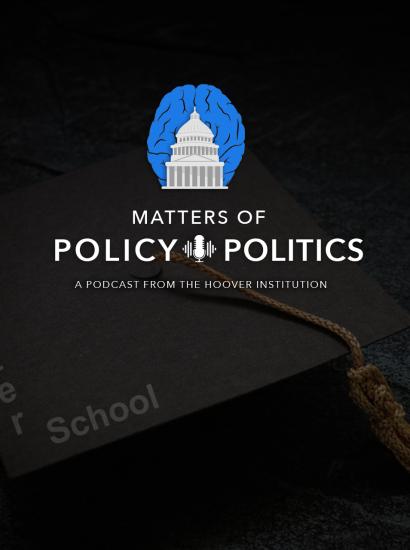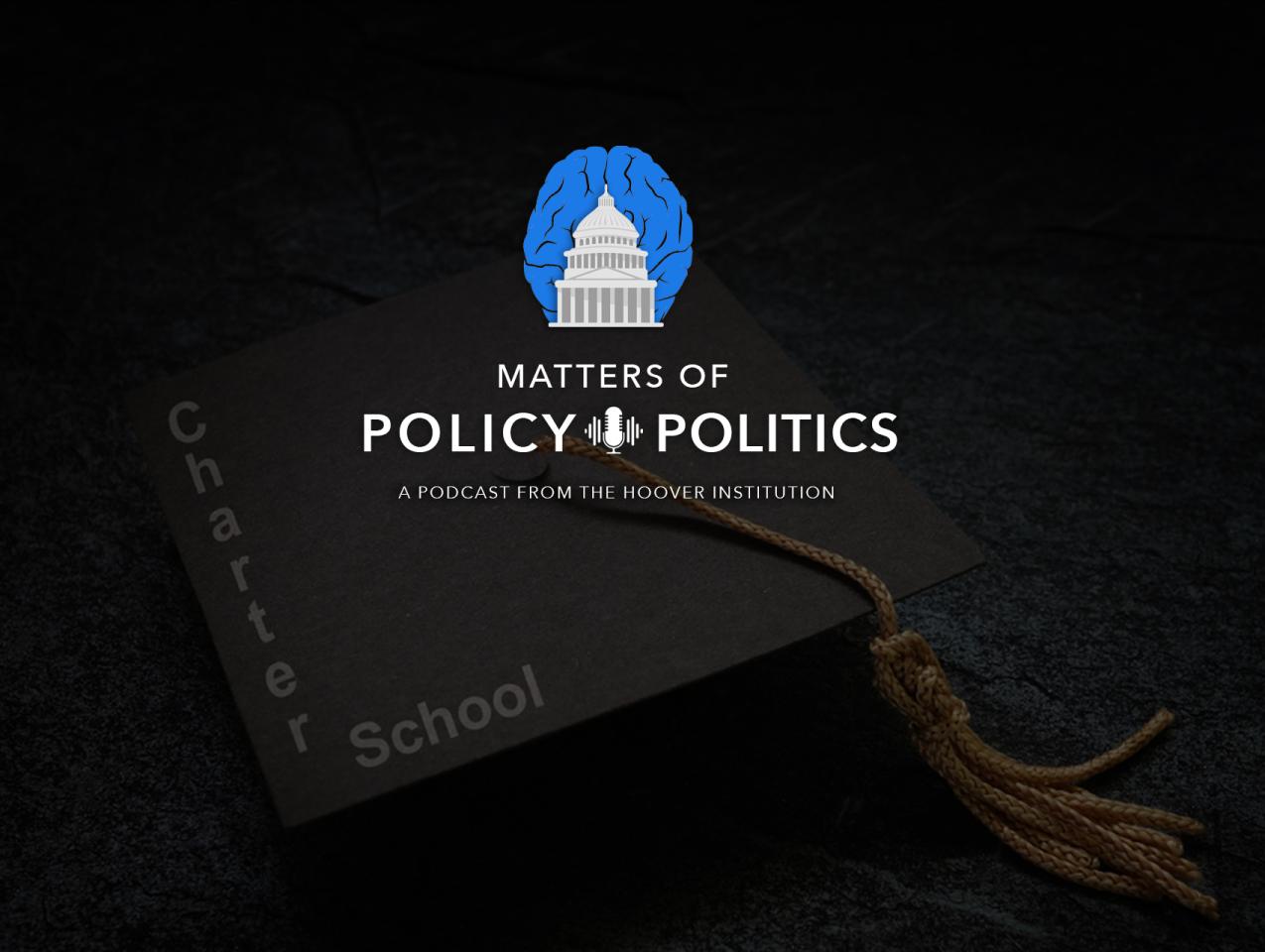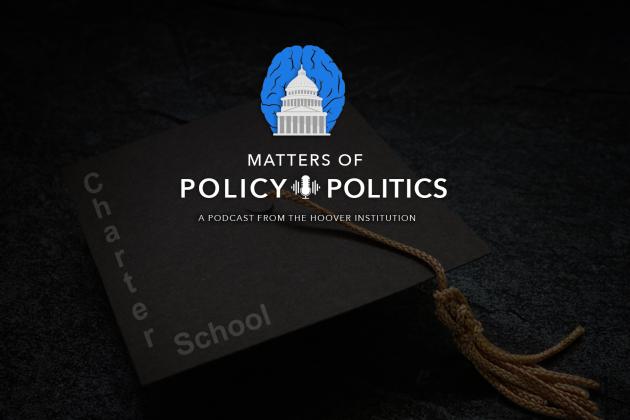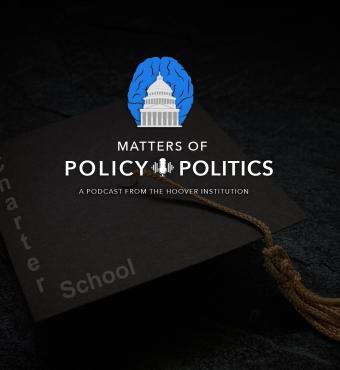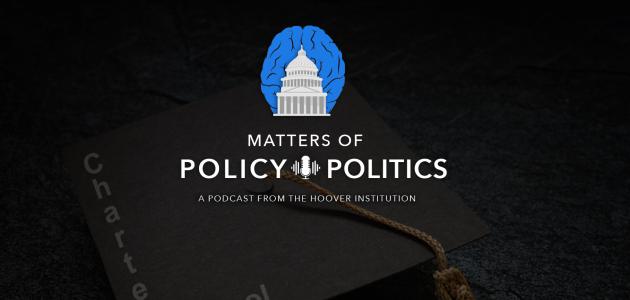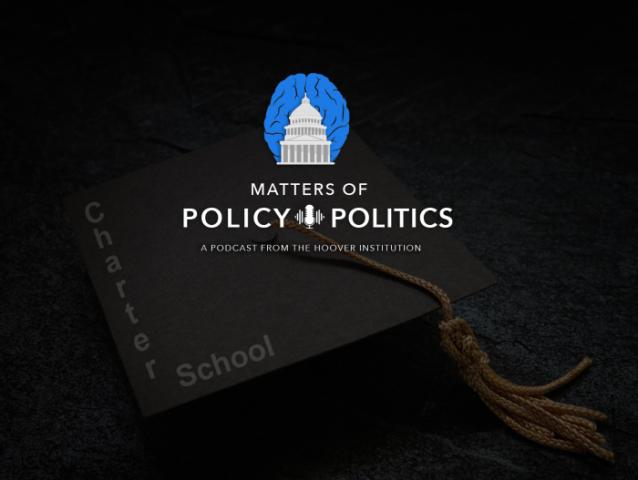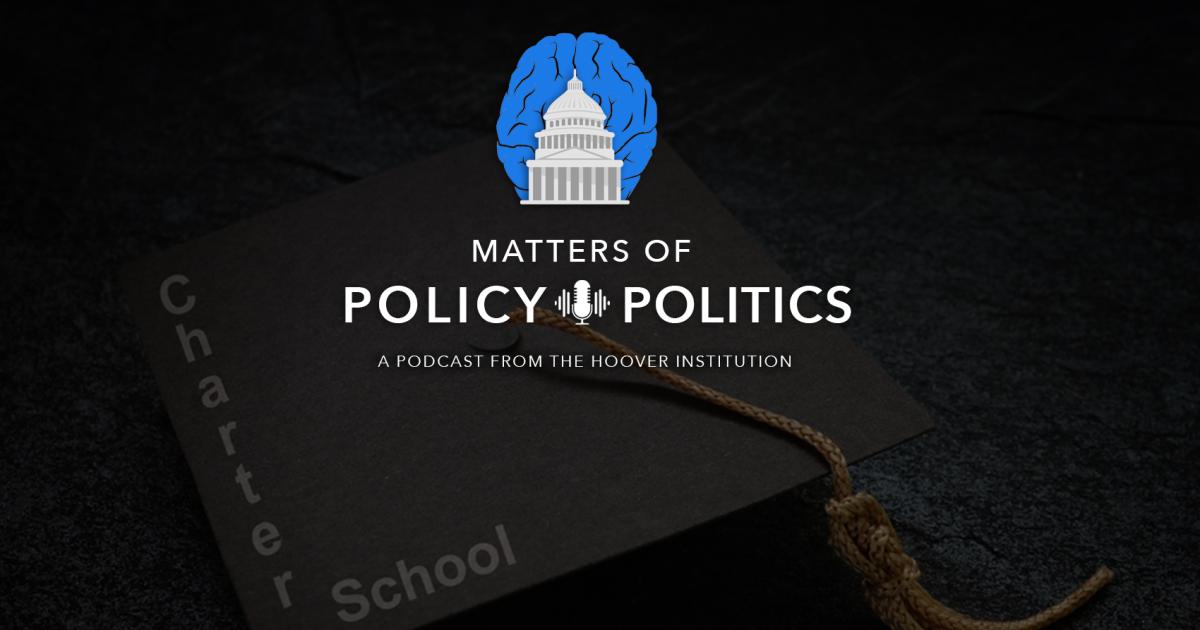- Education
- K-12
A recent data study on America’s charter schools – the third in an ongoing series – shows students with average learning gains of six days in math and 16 days in reading for the academic years 2015-2019. Macke Raymond, a Hoover Institution Distinguished Research Fellow and founder and director of Stanford University’s Center for Research on Education Outcomes, which authored the study, discusses lessons learned and the status of the three-decade charter school movement, the push for better performing traditional public schools, and a growing national conversation on classroom outcomes.
>> Bill Whalen: It's Tuesday, June 27, 2023, and welcome back to Matters of Policy and Politics, a Hoover Institution podcast devoted to governance and balance of power here in America and around the world. I'm Bill Whalen, I'm the Hoover Institution's Virginia Hobbes Carpenter Distinguished Policy Fellow in Journalism. I'm not the only Hoover fellow who is podcasting these days.
I suggest you go to our website, which is hoover.org dot. Go to the tab at the top of the homepage. It says commentary. Head over to where it says Multimedia and up will pop all of our audio podcasts, as we list them, there are 16 in all. Proud to say that my humble little podcast is at the top of that list.
And I think that's a reflection of the quality of guests that I get with the Hoover Institution today being no exception. My guest today is Macke Raymond. Macke is a Hoover Institution Distinguished Research Fellow and founder and director of the Center for Research and Education Outcomes, or CREDO for short.
At Stanford University, Macco's CREDO team conducts independent research and evaluation of programs that aim to improve outcomes for students in America's K through 12 public schools. At research done in collaboration with approximately 30 state education agencies across the country. CREDO's mantra is, quote, we let the data speak.
So in the spirit of that sentiment, this podcast will be no different. Macke will be speaking about what her team's latest data says about the state of America's charter schools. Macke, thanks for coming on the podcast.
>> Macke Raymond: Good morning. Thank you for having me.
>> Bill Whalen: So this study, which is technically the National Charter School Study 3, or NCSS 3, as you very smart people like to give initials to, I can't escape this study, Macke.
I am something of a information hound. I spend an unhealthy amount of time on the Internet looking for news and information that comes in handy for podcasting and so forth. This study keeps popping up. I go for walks, I listen to podcasts. The other day I put on the Wall Street Journal's Potomac Watch podcast, they talked about this.
So question, Macke, are you surprised by how much attention this received? And if so, I'm kind of curious if she thinks this is reflection of interest in charter schools, which are still kind of exotic and misunderstood to a lot of people, or maybe this is just part of the larger kind of confusing narrative about public education.
What do you think?
>> Macke Raymond: Well, I have to say I think it's a little bit of both, Bill. This is the third time that credo has come forward with a charter school study and there's something about building an audience over time that I think has played out here.
The news about charter schools is obviously of high interest across the country. Politics are at a pitched fever at this point around how public education is organized and delivered. The news in this study, I think, is noteworthy in and of itself, so that adds to the interest. And finally, I think in this post Covid world in which we sit, there is a deep interest, hunger, need, desire for information about how we can improve education so that students who are, have been affected by the pandemic actually have a future pathway to better results.
>> Bill Whalen: I wanna get to the highlights of what the study found, Macke, but first, let's talk a little bit about what exactly charter schools are. They've been in existence, I think, since about 1991, if I'm not mistaken. I think the first one was opened in St. Paul, Minnesota.
>> Macke Raymond: You are correct.
>> Bill Whalen: I worked in the governor's office in the early 1990s where we were keenly aware of what was going on in the likes of Minnesota and Wisconsin, other states with charters. So I just happen to know this is off the top of my head, but a few misconceptions, Macke.
First of all, a lot of people think that charter schools are private schools.
>> Macke Raymond: Well, yes, they do. And I should mention that the title of our report is, as a matter of fact, semicolon, the national charter school study three. And the reason we did that was because they're so even now, after 30 years of having charter schools available as options for parents and families, there is still a tremendous misconception about what charter schools are and how they operate.
Charter schools are public schools that operate under special legislation in 45 states, and they are empowered as public schools to operate outside of the traditional administrative structures of local school districts. They are given a degree of flexibility in order to design programs that they believe will adequately or superiorly serve students and their families.
But they're only empowered for a limited term. That's the term of the contract, that's the charter. And at the end of that, they have to report to an authorizing body that reviews their performance. And as the legislation requires, if the performance of the school is not adequate, if they are not performing well, the authorizer has the discretion to intervene with them or to shut them down.
So it's a very different operating style than what we see in traditional districts across the United States.
>> Bill Whalen: Okay, second, misconception, Macke, is the opinion that charter schools are parasitic. In other words, they steal money from public schools.
>> Macke Raymond: So as a public school, it's a really difficult challenge for a public school to steal money from another public school.
Can't quite get my mind around that. But at the core of this is, I think, an operating assumption that the local school district somehow has a prerogative to control every single dollar going into public education, and they ought to be able to maintain that. I would argue that that's probably only fair if, in fact, the district school is performing well and that kids are getting a good education where that's not the case, and families have decided to go elsewhere where those other schools are public schools, those dollars still remain in the public domain.
>> Bill Whalen: Okay, and then the third misconception is that they are elitist in the sense that they don't welcome low income, under-performing kids. And maybe, Macke, that ties into the misperception that they're private schools.
>> Macke Raymond: Well, it's really interesting because the vast majority of charter schools operate in the absolute worst neighborhoods of urban districts.
>> Bill Whalen: Right.
>> Macke Raymond: And they are intentionally located there in order to provide minority families and families in poverty with educational choice. And as we saw in this study, the majority of urban charter schools do extremely well in providing education to their children. The gains that those students get is far greater than what they would have gotten had they gone to the local district school down the street.
>> Bill Whalen: Okay, let's get into the study now. So what you looked at was year to year progress. This is from the years 2015 to 2019. So this is pre-COVID, right, this is pretty lockdown data we're looking at. So the biggest takeaway I saw was charter school students experiencing average learning gains of additional 6 days of math, 16 days in reading.
Were you surprised by this?
>> Macke Raymond: Well, yes, I will take a step back and say this is the third study. When we published our first study, the results were the other direction, that in both reading and math, charter school learning was not as good as the district schools those students otherwise would have attended.
And that was a big clarion call for charter school operators and their supporters across the country. The second time, which was in 2013, we found that in both reading and math, they've made progress. But the absolute level of progress, they were a little bit better in reading and they were about the same in math.
Well, two data points don't actually create a trend, so we had no idea what we were going to see this third time. We didn't know whether the expansion of the charter school community by several thousand schools meant that the results would taper back. Back down, or whether we would see a continuing rise.
And so when we see that there's positive gains in both subjects after the ten year interval since our last study, this is actually a really important finding.
>> Bill Whalen: Is just as simple, Macke, as a case of schools finding their stride? Or is your sense that charter schools are just kind of learning along the way and doing things better?
I mean, I know we're talking about data, and you don't want to come to conclusion based on this. But I'm just kind of curious as to the turnaround, because we're talking a decade ago, 15 years ago, schools were struggling. 15 years later, charter schools were actually doing much better, they're progressing.
>> Macke Raymond: Yeah, it's a really great question, Bill, because the evidence, as we probed it showed a couple of different things. We wanted to make sure that the effect that we saw was real and to try to explain it as much as possible. And so the first idea we had was, maybe the new schools that have opened up are a lot better, and they're basically dragging the sector with it.
And that turned out not to be the case. While the new schools are doing well, they're not doing as well as the older schools. And so when we probed, well, how are the older schools managing to do better? We could see within the individual trends of schools that schools were getting better over time.
And that is a phenomenon that in and of itself is a pretty important finding because that's not something that you see on the district side of the equation.
>> Bill Whalen: Right, and I think one thing worth clarifying is that you're not suggesting that this is a panacea, that everything is magically wonderful in the world of charter schools.
You still find troubles out there, don't you?
>> Macke Raymond: Sure, the news is not completely homogeneous. I mean, there are some extremely bright spots, and I hope we'll get a chance to talk about those in a moment. But the fact remains that across the nation, there are still a substantial percentage of charter schools that are not doing well in educating their students.
Remember, we're looking at academic performance as measured by academic progress from one year to the next. And that's the thing that we look at. And we found that there were substantial shares of charter schools in both reading and math that just weren't as good as the district schools.
Now, if you think about the fact that most charter schools are urban and most district schools are urban, and the history of urban district schools is nothing great, then not being better than that is a pretty sad place to be.
>> Bill Whalen: All right, so let's talk about why a charter school sees, Macke, if there is such a thing as a formula of success here.
Because seems to be have several moving parts going in. One would be the business model, which is how the charter is established, how is the school run. Second would be management, that would be the administrative side and the faculty side. By the way, I have a bias here, I have a niece who teaches at a charter school in Charleston, South Carolina.
So I happen to be very fond of the concept. But there is a factor of administrators and teachers, and then thirdly, the kids themselves. As you look at these schools that are succeeding, Macke, what would you attribute to, is it the plan itself, or is it the execution of the plan?
>> Macke Raymond: Yes, yes, and yes.
>> Bill Whalen: Okay.
>> Macke Raymond: When we probed the data, what we found was that the oversight bodies seem to be getting more adept at discerning good applications from not so good applications. And so, as I mentioned before, the new schools that are coming online are actually producing strong results relative to district schools.
That is a change in and of itself. So the authorizer function is getting better, terrific. We find that schools are getting better over time, and a large driver of that is whether or not the school participates, is a member of a charter management organization, a network of charter schools that are managed by a central entity.
We found that schools that are part of charter networks actually produce even larger gains for their students than standalone charter schools. And finally, you asked about the students themselves.
>> Bill Whalen: Yes.
>> Macke Raymond: One of the sort of hackneyed criticisms of charter schools over time is that they are selective in some way about the students that they admit.
Now, the law is very clear that charter schools are not allowed to be selective on admissions. They must take all students who apply. If there are more students that apply than there are seats available, they must select by a lottery process so that everybody has a fair shot.
Well, so the question still remains, is there something going on that makes the population going to charter schools look different than the schools, the students that go to district schools? And so we did an extensive analysis to see if that was the case. What we found was that, in fact, that's not it.
On the basis of demography, charter schools enroll larger shares of minority and poverty students than attend even the district schools down the street from them. But more importantly, when you look at their academic preparation, what we find is that charter schools enroll greater proportions of kids with low levels of achievement and smaller proportions of kids with high levels of achievement or preparation.
And so, at no point across the continuum are we able to identify a pervasive practice that all the critics seem to believe is going on about charter schools. It just didn't show up in the data at all.
>> Bill Whalen: So let's discuss, Macke, why charter schools are improving, but overall public education lags.
I have some really just depressing stats I'm going to throw at you here in a few minutes on public education. But here you have a report says, look, from 2015 to 2019, we saw gains in reading, we saw a gains in math. But I don't think, Macke, in most public schools across America, you can show such glowing numbers.
So what are charter schools doing, Macke, that conventional public schools are not?
>> Macke Raymond: So I should say at the outset that our ability to discern the mechanisms within schools are pretty limited because we're looking at a large population of global statistics about them. But we do see this improvement over time.
And what we have discerned is that the DNA of charter schools rests in the authorizing legislation and the policy framework that they set up, which is the flexibility that charter schools get in order to design their programs. They can pick how many days they go to school. They can pick how long the school day is.
They can pick how long a school year is. They can arrange staffing however they wish. They can choose their curriculum. They can choose their modes of instruction. They have a lot of discretion about how they deliver the education to the students that they educate. That's great. On the other hand, at the end of their charter, they have a much more certain degree of accountability than district schools have faced ever.
And so the likelihood of showing up at the end of five or seven years or whatever the term of the charter is, with a record of performance that's going to be highly scrutinized, is much higher for charter schools. And we think the balance there of the flexibility with the real risk of accountability on the part of the authorizers is the sort of secret sauce that gets people thinking about adapting little bits and little bits and little bits and gets better over time.
>> Bill Whalen: Does a study like this, Macke, get traction within the world of education administration? In other words, let's say you're running the LAUSD, or the San Francisco USD, close to where we live. Do you look at the study and think, geez, maybe we need to shake up the equation, we need more charter schools?
Or do you think that maybe administrators is very wishful thinking, administrators look this and think, it's time for us to run our schools the way the charters are. Or it's just there's too much of a wall between charter schools and the other public schools.
>> Macke Raymond: So I probably will sound a little pollyanna ish about this, but I don't think that districts are monolithic.
I think that there's a lot of variation across school districts, and I think they face differing circumstances across the country. I will also just, I will extend grace to believe that everyone in K12 education at this point is desperate for clues about how to do things better because our students have been so harmed over the last few years.
I think that certainly at the state level, the reception that this study has gotten among state leaders, even those that do not have a strong public support for charter schools, has been stronger than I would have expected. I have heard from a few district superintendents that are interested in learning more.
They're interested in a level of mechanics and on the ground change that we can't help them with. But we can certainly point them to schools that are doing exceptionally well in their neighborhood that they could actually go talk to to get the answer to that.
>> Bill Whalen: You sense, Mackie, that we're having a moment in the great education debate.
I mean, you've been in Hoover, I think you were at Hoover before I were. You were one of the first people I met, actually, when I came to Hoover.
>> Macke Raymond: I was one of the first peoples.
>> Bill Whalen: I think you invited me to play squash, actually, which I think probably would have been very bad for my health cuz I think you would have run me over the court like crazy.
But no, you've been studying education for some time, Mackie, and I wonder if you think we're entering a new phase in the conversation. I study politics for a living. I will take you back to the 2021 Governor's race in Virginia, where a fellow named Glenn Youngkin, a venture capitalist with no political experience, was running an uphill campaign for governor against a former governor.
And Youngkin landed on the issue of education, his advisors didn't think it was a good idea, but Youngkn pursued with it. Here's what Youngkin was saying in the closing days of the campaign Mackie, quote, it all starts with recognizing that our curriculum has gone haywire. So on day 1, we're going to ban teaching critical race theory in our schools.
The crowd applauds, day 1, day 1. That became his chant. What he was seizing on, Mackie, was the situation in Loudoun county, where parents were upset about a rather woke curriculum. This was kind of a shock to Virginians because Loudoun county is an excerpt of Washington, DC. You wouldn't expect it there, but this is going on.
I was surprised, I was surprised at Youngkin one, I was surprised that this issue had such potency, and this was pre, this was right after COVID, just kind of after lockdowns. So I just wonder, Macke, if you think that we are just headed into a very large conversation about the state of schools.
>> Macke Raymond: Well, I think that conversation is actively underway. I would say that at the time that those conversations occurred and that Youngkin had his campaign platform, we didn't really have a good understanding of how badly kids were impacted by the pandemic. I would say that the conversation that happens now is actually less focused on curriculum and less focused on banning books and libraries.
Then what the heck are we doing to recover the academic life of these students? That is, I think the conversation that we are about today, and there is deep interest, deep concern, deep worry that the efforts that we are trying now to try to restore student learning. If they're not effective, that we are basically handing an entire generation a life sentence of under productivity and under preparation.
>> Bill Whalen: Right, so Youngkin-
>> Macke Raymond: So I think it's a timely issue, but I don't think it's focused in on the cultural wars that you were discussing a little bit.
>> Bill Whalen: Right, yeah, so Youngkin went for the headline, he went for the culture war, he went for wokeism. But what you're suggesting is that outcomes is really what's the debate here?
>> Macke Raymond: Well, I think that's right. And it's not just because I'm an outcomes kinda guy, but I think that there is now broader recognition that what kids learn in school materially affects not only their own life chances, but the livelihood, the economic well being of communities and states and the nation as a whole.
And the outlook isn't particularly positive right now. So I do think that this is a reckoning that was already due before the pandemic. But having parents look over the shoulders of kids while they were at home trying to do remote learning, they've got to see what was going on in school.
They got to see whether teachers were doing a good job helping kids address their challenges or their stumbling blocks on their learning path, and didn't like what they saw. And now that we have more data about how badly kids were affected, the combination of those two things, parent concern and now education policy leader concern, I think combine for a very powerful motivation to take a deeper look at how we can do this better.
>> Bill Whalen: That would be my cue Macke to give you some very depressing data, which I'd like you to explain to me. So this is the October 22 National Assessment of Education Progress report, NAEP for short, N-A-E-P. It gauges fourth and eighth grade proficiency in reading and math in California.
Here's what NAEP found Macke. 85% of Black sixth grade students and 79% of Hispanic sixth graders do not meet state match standards. I'll repeat that. 85% of Black sixth graders, 79% of Hispanic sixth graders do not meet state math standards. Among economically disadvantaged 11th graders, Mackie, 83.5% didn't meet state math standards.
Five out of six students, 55%, didn't meet state English language art standards. They also looked at fourth grade reading and performance gap between white and minority students. Mackie the gap was NAEP's words, quote, not significantly different than it was in 1988. Let me repeat that. Not significantly different than it was in 1988.
This is before charter schools. We're talking 35 years in California Macke, with no progress. And by the way, the state of California right now spends about $24,000 per kid. Back in 1998, it was about $11,200. So it's not that we're not putting money, we're not getting outcomes. So I know we could have an entirely different podcast on this, but why does a state like California just continually languish like this?
I mean, this is almost criminal, these numbers.
>> Macke Raymond: Well, I think we could talk for a very long time about how we got to where we are. The bottom line for me is that we have a legislature that is essentially captured by a set of interests that are not interested in student outcomes.
That's not where they want the focus to be. They want the focus to be on resources going to the members of their organizations. And we have now more than two decades worth of a record of repeated legislative action that advances the interests of adults over the interests of kids.
With some expectation that the great anonymous somebody is gonna take care of this someplace else. And as we talk about in our team and we talk about when we're talking with policy leaders, somebody doesn't work here. There is no somebody. And so we are now reckoning in a very real way with the fact that we have harmed cohort after cohort after cohort of kids with policies and procedures that protect and completely insulate, I should also say, educators and administrators, over the interests of kids.
If that's not selling the seed corn, I don't know what is.
>> Bill Whalen: Right, what is the outlook for charter schools in California?. I don't wanna make this too much of a California centered podcast, but I'm concerned that this week, concerned in this regard. Jerry Brown, the previous governor of California, he was interesting.
He was a Democrat, but he was not necessarily beholden to teachers unions. He was a former mayor of Oakland and I think he created two charter schools when he was mayor of Oakland, so he was not anti-charter. You know, fast forward to the current governor, Gavin Newsom who I think before the pandemic, Mackey, he signed legislation that basically makes it easier for local districts to deny charters, a recharter, if you will.
In other words, just gave them kind of wider leverage for denying renewals. So if you're looking at charter schools in California, what is the outlook? Is it strong? Is it neutral? Is it negative? How would you assess it?
>> Macke Raymond: I think it has been a struggle for the better part of the last decade, and I think it's going to continue to be a struggle.
Where I see the potential flashpoint here is exactly what we were talking about, which is that with the exception of our state policy leaders in California on education, there's a growing recognition among other electeds and among families and communities that we're spending a lot of money on education and we are not getting results.
The results for California charter schools in the latest study was substantially positive. It wasn't perfect, they were not as strong in math as they could have been. But there has been a growth in the number of charter schools across the state. The newer schools continue to contribute positively to student learning, and I think families, as more charter schools come online and they generate more waiting lists than they have seats for, there is a political block there that is extremely motivated to protect that.
Whether or not they can convince their state legislators to buck the party line, which is all things good for educators, it remains to be seen. But I think that the potential for that block to be effective in shaping legislation going forward is stronger than it's ever been. Whether it's enough to be strong to block some of the hindering intentions of the legislature remains to be seen.
>> Bill Whalen: Have you and your research team, Mackey, taken any looks at homeschooling?
>> Macke Raymond: There's very little data on homeschooling, so it's not a lack of interest on our part. But once a family decides to remove a child from the public system and take education into their own hands, there's very little information that we can see.
They don't necessarily follow whatever the curricular requirements are and we don't have any testing on them to know how they're doing. It was understandable during the pandemic that a lot of families took their children's education in hand because the alternative was so poor. Schools were closed, kids were at home.
But as a growing movement, it's a little bit concerning that we have no line of sight on whether or nothing homeschooled children are being adequately prepared.
>> Bill Whalen: I'm curious to how you would study it, Macke. Because if you look at pre and post-pandemic data according to the census bureau, households before the pandemic, about 5.4% of American households had at least one homeschooled kid.
After the pandemic, it's up to 11%.
>> Macke Raymond: Well, so I don't actually believe the 11%. I have to tell you. I think that number was obtained during a period where there were still a lot of open closure, open and close and open and closed. So I think that number will come down.
But I think it is the case that a lot of families have decided to remove their children. How would I go about that? Well, the state constitution in every single state has the requirement to educate children. And while then details of that requirement change from state to state, the state still has a vested interest in preparing the next generation of citizens, both academically and socially, culturally to be able to take their place in society.
I would say that that makes it a realistic option to suggest that students have to check in at various points along the way to demonstrate what they know so that the function that states are required to complete can be satisfied.
>> Bill Whalen: Let's talk a bit more about what schools are doing after COVID.
Mackey, you and your credo researchers have been looking at learning patterns in states to see how recovery efforts will affect students academic careers and here's your conclusion. I'm gonna quote, most of the program school districts. Most of the programs school districts have implemented to address COVID learnings loss are doomed to fail.
Let me repeat that, most of the programs districts have implemented to address COVID learning loss are doomed to fail. You could not have chosen bleaker words of that, but why are they doomed to fail?
>> Macke Raymond: Well, very simply, no one's done the math. The solutions that they've chosen are to add on additional instructional time even if that instructional time is of unbelievable high quality, which one could question.
The students that need the most help in recovering their learning loss are also students who learn at the slowest possible pace. So even if you're delivering high quality instruction, the uptake of students may not be as high as we want, particularly in the most damaged students. And so if you add up the limited number of extra instructional hours that are being offered, even at optimum levels and the fact that the students who need it the most are acquiring it at a lower rate than the average kid, you cannot make it up on time.
It's very simple, the math just doesn't work out.
>> Bill Whalen: So the ear is gone.
>> Macke Raymond: Well, no, I don't think that's the case. I think that there are opportunities to actually, fundamentally change the rate at which kids learn, but it requires that we do very different things in the classroom and we require a very different level of quality in the instruction that kids get.
That is something that in many, many states is a bridge too far.
>> Bill Whalen: Because the establishment is just too rigid, it just will not adapt. It just is a problematic that it won't adapt or won't admit that there's a problem, because there's such a thing as denial and acceptance.
>> Macke Raymond: So you're an astute journalist and you know that there's often the public spoken game and then there's the game in the back room, right? The public spoken game is there's no problem. The game in the back room is, I believe, holy heck, what the heck? What are we going to do?
And the degree of effort that would be required to produce a successful solution there is out of reach politically, economically, you name it.
>> Bill Whalen: But I'm curious about the public side of things, Mackey, and here. And again, we'll go back to California in this regard. If you watch ballot initiatives in California, the easiest way to kill a ballot measure in California is to trot out a teacher, a nurse and a firefighter like the village people, if you will.
And put them in that and have them say, we think this is what's bad for California and why, Mackey? Because those three people represent what's good, a firefighter, nurse, and a teacher. Teachers were played a very prominent role in a recent ballot initiative, Mackey, which had to do with Proposition 13 for our listeners who don't know what Prop 13 is.
It's a cap on property tax in California. It's why Macke and I can live within proximity of Stanford University. Without Prop 13, we'd be goners, I think. But there was an effort to change Prop 13 and blow the cap off it on the property side of the tax.
And the folks running the campaign decided the best way to sell this tax was to trot out teachers and say, this is what's best for schools. It'll give us money that we need. And Mackey, that thing bombed at the box office, it just got crushed by voters. And I wonder if maybe it was bad thinking that people upset with pandemic, people upset with lockdown and people father seeing way too many teachers on Zoom and protesting.
And we all saw the union leader in Chicago who was doing a Zoom call from the Caribbean and so on and so forth. I just wonder if teachers have maybe lost a little luster when it comes to the pitch people and salespeople.
>> Macke Raymond: Well, once again, I think that there's a big difference between the manipulations of teachers by the unions and the actual rank and file attitude and disposition of teachers.
So I wanna be very clear that I am not anti teacher at all. I think that there are a variety of points of view on this. Where I think the unions actually are brilliant in their strategy is that the degrees of freedom between any one citizen in California and a fireman, a nurse, or a teacher are about zero, right?
Like, we all have connections there. And so the strategy here is that you're not going to undermine your cousin or your sister or your brother in law. You're not going to take action that harms them directly. And so the implicit, you know, has less to do with what they say on the screen than it is about the fact that they are tapping your very intimate network by saying, don't touch this.
And I think it's brilliant. And unfortunately, I don't think it represents both the best interests of the states, nor necessarily the majority view of teachers nurses and firemen, I don't know.
>> Bill Whalen: Right, but in California, Mackie, you would have seen closed schools. And also if you lived here in, let's say, the Bay Area, you'd see teachers on strike in Oakland during the school year before the pandemic.
You saw teachers on strike in Los Angeles during this school year. And I grew up in a time when teachers didn't do this during the school year. It was considered not cricket to do that to kids.
>> Macke Raymond: You're right.
>> Bill Whalen: Okay, let's go back to charter schools for a bit.
Mackey, news yesterday, the Supreme Court declined to hear a case focused on a dispute over a North Carolina charter school's dress code, of all things. Hear me out. This is the charter day school, which is located outside of Wilmington, North Carolina. It's barred girls from wearing pants as part of an attempt to promote what the school calls chivalry.
Interesting choice of words. Backed by the ACLU, some parents sued over the policy, arguing that the dress code amounted to sex based discrimination, which is illegal under the 14th amendment. The charter school responded that the policy isn't sexist. Besides, it's not a government run institution, not bound by the Constitution.
And this is the crux of the court matter. So what we have a debate here is over whether charter schools are private entities or public state actors, if you will. And this, Mackey, ties, I think, into the next chapter in the charter school saga, which is religious charter schools.
The state of Oklahoma earlier this month approved the nation's first religious charter school. It is run by St. Isador of Seville Catholic Virtual School, run by Roman Catholic Archdiocese of Oklahoma City and the Diocese of Tulsa. The question here, Mackey, is I don't want to push you on the side of religion or not, but are we gonna see more creative ways to implement charter schools?
I mean, cuz the idea of putting the church behind it, that's a creative solution. Now, it gets into complicated constitutional questions, but to me, it's also thinking outside the box.
>> Macke Raymond: So I do think that there is both a need and an interest in creating more charter schools in the United States.
I think the specific instance in Oklahoma is a carefully orchestrated test to see if it's possible to use the charter framework to edge closer to more of a private school/voucher solution. My own position on this is that there are religious organizations that operate charter schools today, but they do not include a religious component.
And so really, the step over the line here is the expressed intentionality of making this a religious education experience for the students. I do not think that that actually aligns with either the Oklahoma charter school law or the well proven distinction between church and state, particularly in education, that there's a huge body of law for.
So I would be very surprised if this stands, and I would be extremely surprised if the diocese doesn't return to a different solution in order to obtain public funding, which is what their ultimate interest is, in order to serve students.
>> Bill Whalen: Right, that's one difference here. I think St Isador would be entirely government financed.
If you go to New York City, for example, Mackie, there are Hasidic schools which receive public dollars through various programs. So it's not that religious schools don't get government money. In this case, the charter school would be entirely government finance. But also, Mackie, it's the question whether or not the charter school is a quote unquote, state actor.
>> Macke Raymond: You're absolutely right. And the refusal of the state of the Supreme Court yesterday to hear the case and allow the appellate decision, which was that charter schools are public institutions and therefore must respect the constitutionality. And the protections for students, is a very clear signal that charter schools are public schools, they're public institutions, and therefore the dress code discrimination was considered illegal.
>> Bill Whalen: Okay, so Mackie, CREDO's first charter school study was 2009, if I'm not mistaken. CREDO's second charter school study was, I wanna say 2013.
>> Macke Raymond: Correct.
>> Bill Whalen: Okay, so now we have a 2023 study. When will the fourth study be done?
>> Macke Raymond: That is a really interesting question.
And I have to say, the ink wasn't even dry on this study before people were asking for the next one. And I understand, why because we've had a pandemic. But the barrier to doing the next study is we've had a pandemic. And that has caused a real disruption in the programs for assessing how much students know in 2020.
About the first thing that happened when governors ordered schools to be closed was that state education department leaders went to the us department and sought waivers on the testing program for the spring of 2020.
>> Bill Whalen: Right.
>> Macke Raymond: In 2021, things were still in a pretty significant state of disruption.
There was some testing in some places, it wasn't complete, it wasn't great. 2022, we started to get back to a little bit of a cadence of testing, and that was the first sort of signal that we could really see a pretty consistent, reliable picture. And we've just had the second season in 2023.
Well, it's going to be at least another three years before there's enough data to be able to create the kind of study that we did this last time. And it's not clear to me that we aren't going to encounter a growing dissatisfaction with accountability. We essentially don't have accountability on the district side of public education these days.
And I'm not sure that state leaders are rushing to try to reinstate that. So the more they back off of accountability, the less important testing is. The signals are not aligned with rigorous assessment. It's not clear to me that in the out years going forward, we're gonna see assessments actually be as reliable as they used to be.
So I think all bets are off until we actually can take a look at what gets produced in the next three or four years.
>> Bill Whalen: So if you could change this equation, Macke, what is the first thing you would change? And everything you just described in terms of the frustrations and getting data, in terms of the resistance to doing this, what would be the first step in changing things?
>> Macke Raymond: It's an interesting question, because I think you have to be very strategic about where you wanna lay your knife edge in order to start creating new space. My own idea is that I believe that there are schools that are not charter schools, that are other public schools that I think actually deserve the kind of flexibility that charter schools enjoy.
That I think they are sufficiently high performing that their teacher teams and their school teams actually ought to be able to do a little bit more creative programming for their schools. And because they're high performing, the risk on the accountability side would be negligible. I'd like to see more of that start to happen, because I do think that this general framework of flexibility for accountability creates the right kind of incentives.
I think a full frontal assault on this is probably not, it's not worth even trying, cuz I don't think it would be successful.
>> Bill Whalen: The change you just mentioned, Macke, does that come from within a school district or does that have to come from a higher power? I guess what I'm getting at is who has to drive this at the end of the day?
Does it start all the way with a leader like a governor in a state? Does it go down to a legislature or, say, whoever the education secretary is, or is it more close to the level of schools themselves, the people who run the schools?
>> Macke Raymond: Well, obviously, efficiency criteria would make the governor the obvious choice.
The kind of single pen swipe that could change things is certainly within reach for some governors, but I think it is not a topic that most governors would wanna take up. Legislators, the legislatures divide very, very clearly on whether or not they are willing to entertain education improvement as a focus of their legislation.
And again, I think the costs of business doing that are really, really high and without a lot of certainty of outcomes. So my answer is that we should allow the sort of 1000 flowers blooming strategy that we started charter schools with. I think we should try to do something like that, which is a more localized reaction, but I think you'd get more action at that level than you would by trying to press these larger levels.
>> Bill Whalen: And who's gonna drive the expansion of charter schools, Macke? Is it going to be parents? Is it going to be, let's say, benefactors, philanthropists? Is it gonna be more business driven, let's say? Because you could draw a line between businesses wanting to have smarter kids coming into the workforce, and so you say, okay, these schools produce better kids.
We want more charter schools. Who's gonna drive it?
>> Macke Raymond: I believe that parents are going to be an important driver, here because they're going to demand high quality options for kids. I believe that there are other stakeholder groups that probably are starting to lean in on this. You mentioned business owners, and that's certainly an important stakeholder group.
I think ultimately, state policy leaders in education have to face the fact that they have large numbers of schools that are not performing. And that that's an unsustainable position to maintain, both for them individually as leaders and for the state as a whole. So I think we'll see some state pressure from the education side of the policy equation.
>> Bill Whalen: Okay, Macke, final thoughts, anything we did not get into this podcast, especially charter schools, you'd like to say before we sign off?
>> Macke Raymond: Well, the one thing I thought we might cover is the fact that our study revealed that there are schools that do not only a phenomenal job of making progress for kids across the board, even better than state average of growth.
But they're actually able to ensure that no particular student group falls behind in their learning. We call these gap busting schools.
>> Bill Whalen: Gap busters, yes.
>> Macke Raymond: And I really think that this is not only an extremely important finding in terms of the welfare of those individual students, but it shows policy leaders and other educators that allocation of resources can be done differently to get much better results.
And I think it's that evidence proof that is the spark that can start some of these wheels that we've been talking about rolling forward for kids.
>> Bill Whalen: And you were surprised to find these gap busters?
>> Macke Raymond: We were, and we were certainly surprised to find the number of them and the fact that they are also found in some of these charter networks, which means that this is a practice that can not only occur, but it can be scaled.
>> Bill Whalen: Mm-hm, and final question on charter schools, Macke, I think the balance is 85% urban and 15% rural right now across America.
>> Macke Raymond: I think that's a little high a little high.
>> Bill Whalen: Little high, so its less than 85%. Where do charters need to expand? Would you expand them in so-called flyover states?
Would you expand them across the greater us? Do you need to put them into more urban areas? Or i'ts just as simple as saying we need to go where the lower performing districts are?
>> Macke Raymond: Well, its an interesting question. I'm certainly in favor of encouraging expansion where district level performance is not strong, but that's not limited to just urban areas.
And I don't want to condemn all urban areas as poor, because that's also not true. I think there ought to be a sort of a preference for charter location in communities that need to be served well, and that would be largely urban. But there are many suburbs where the students are not making progress either.
Same for rural areas.
>> Bill Whalen: Okay, and finally, Macke, we haven't spent any time on it, but let's do a little bit. And that's really the role that education plays inside the Hoover institution. Lot of outsiders think of Hoover, they think economics, they think foreign policy. But education's a big part of what I do, of what we do.
It's a big part of what our director, Condoleezza Rice, believes in, in terms of improving this society.
>> Macke Raymond: You're certainly right. We are incredibly lucky that Dr. Rice has not only a professional interest as a world leader in education, but she's got a personal investment in making sure that we move the needle for kids in the United States.
She recently appeared on national news and called our situation, particularly after these NAEP results, sort of not only a crisis, but really a condemnation of our ability to prepare our next generation. She's backed up her convictions with strong support for growing the amount of work that we do in education at the Hoover institution.
And she's been a phenomenal ally in terms of being able to build bridges in places that we haven't been able to do that before. So it's a great set of team members and teamwork, and I hope that we're able to continue that in the future.
>> Bill Whalen: I know you're going on a deserved break here.
What are you gonna be working on this fall, Macke? What are we gonna see from you next?
>> Macke Raymond: We are in the midst of conducting a national panel, opinion panel. We are looking at some of those stakeholders that might be strong advocates for education change that we were discussing just a few moments ago.
We certainly have a lot of follow-on clarification and amplification work that we wanna do about this charter study. And we're actually thinking differently about helping communities understand what the challenges are that they will face in the next five to ten years. As all kinds of trends coincide and force a degree of flexibility and change in the K-12 education system that they've never been required to do before.
>> Bill Whalen: Mm-hm, well, Macke, keep it up, you're doing the Lord's work, and I hope you're pleased with the response that your charter school study got, because it's a needed conversation this country has to have.
>> Macke Raymond: Well, it got me on your podcast, so that's good.
>> Bill Whalen: And in the Wall Street Journal, so congratulations.
Macke Raymond, thanks again for doing the podcast.
>> Macke Raymond: Thank you.
>> Bill Whalen: You've been listening to Matters of Policy and Politics, the Hoover Institution podcast devoted to governance and balance of power here in America and around the globe. If you've been enjoying this podcast, please don't forget to rate, review, and subscribe to our show.
And if you wouldn't mind, please spread the word. Tell your friends about us. The Hoover Institution has Facebook, Instagram, and Twitter feeds. Our Twitter handle is @hooverinst, that's spelled H-O-O-V-E-R-I-N-S-T. Credo, The Center for Education Research Outcomes is on Twitter. Its handle is @credoatStanford, that's a little tricky, so let me spell it out.
It's C-R-E-D-O-A-T-S-T-A-N-F-O-R-D, @credoatstanford. And if you go there, it'll link you to Credo's website, where you'll find the charter school digital report in its full glory. I mentioned our website at the beginning of the show. That's hoover.org. While you're there, you should sign up for the Hoover Daily Report, which delivers you, keeps you updated on what Macke Raymond and her Hoover colleagues are up to.
That's emailed to you weekdays. You can also sign up for Hoover's Pod Blast, which delivers the best of our podcast each and every month to your inbox. For the Hoover Institution, this is Bill Whelan. We'll be back soon with a new installment of Matters of Policy and Politics.
Be talking about California with my colleague Lee Ohanian and Jonathan Movroydis. Till then, take care. Thanks for listening.
>> Jenn Henry: This podcast is a production of the Hoover Institution, where we advance ideas that define a free society and improve the human condition. For more information about our work or to listen to more of our podcasts or watch our videos, please visit hoover.org.







